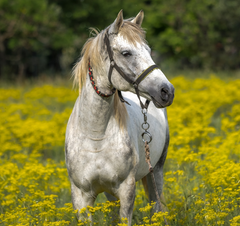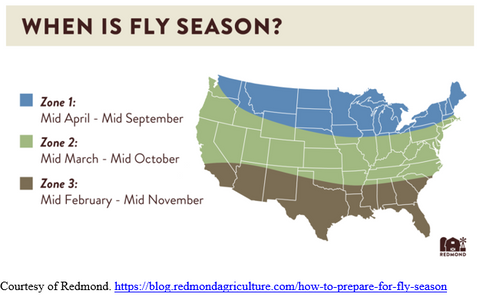
Spirulina is widely used as an immunomodulator, antioxidant, and anti-inflammatory. After my article on spirulina, “Spirulina – a superfood: Fact or Fad?”, many people have inquired about how to use spirulina, when to use it, and what to expect.
➡ How to use spirulina:
As an anti-inflammatory, spirulina helps quiet down the inflammation response. The best time to start it is a couple of weeks before an anticipated event that could cause an inflammatory reaction. This means that you can plan in advance. Some horses may initially object to the smell of spirulina, as it reminds them of pond scum. Once the horse gets used to the smell, most horses will readily eat it in their bucket.
For horses that initially turn up their nose to spirulina, start with just a small amount in their feed, building up to a full serving size. One tip to help them acclimate is to sprinkle the spirulina around their stall or in the general area where they get their hay.
This process can take up to a couple of weeks for the horse to readily accept the full amount.
After the horse readily accepts the spirulina, you may consider switching from powdered spirulina to the spirulina tablets. They aren’t as messy and much easier to handle.
➡ When to use it:
It’s best to have spirulina on board at the full serving size a couple of weeks before the anticipated immune response. Because the immune system can become a runaway train, it's important to start early. It’s much easier to stop the train before it runs away than to try to stop it when it’s going 100 miles per hour.
»Fly season: Fly season starts when it’s warm enough for the flies to thrive. It’s important to have the spirulina onboard a couple of weeks prior to the fly season.

»Pollen season: There are two different types of allergens measured, First leaf and First bloom. Some horses start having issues when the first leaf occurs, while others have issues with first bloom, which is about a month or two after the first leaf.

➡What to expect:
»Fly bites. While spirulina cannot solve the problems with fly bites, it can help calm down the immune response and itchiness involved. When used in conjunction with other fly control methods, the problem with the immune response to the fly bites can be mitigated.
Techniques to reduce the reaction to fly bites:
- Spirulina
- or spirulina plus chondroitin sulfate
- or spirulina plus MSM
- Fly spray
- Fly sheets and masks
- Fly traps and bags
- Fly predators
»Allergies/breathing issues. Regular use of spirulina may be able to support healthy breathing during the allergy prone times of year.
Supplements to help breathing issues:
- Spirulina
- Spirulina plus MSM
- Spirulina plus jiaogulan
We want to keep our horse’s immune system as healthy as possible. To do that, we need to plan in advance as to the best course of action.